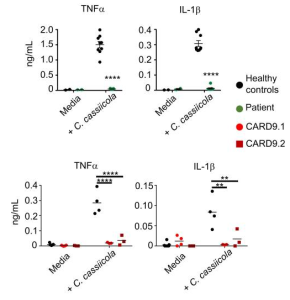A group from Fungal Pathogenesis Section and Immunopathogenesis Section, Laboratory of Clinical Immunology and Microbiology (LCIM), National Institute of Allergy and Infectious Diseases (NIAID), NIH, Bethesda, Maryland, USA, etc. has reported that human Dectin-1 deficiency impairs macrophage-mediated defense against phaeohyphomycosis.
https://www.ncbi.nlm.nih.gov/pmc/articles/PMC9663159/
Phaeohyphomycosis is an invasive fungal infection caused by dematiaceous fungi, which are characterized by melanin production and filamentous growth. Phaeohyphomycosis typically affects the subcutaneous tissues following traumatic inoculation and is treatable with antifungal therapy and/or surgical resection.
In this study, an index patient with severe phaeohyphomycosis caused by Corynespora cassiicola, a dematiaceous fungus of plants known to cause life-threatening infections in CARD9 deficiency is highlighted. This patient had biallelic deleterious mutations in CLEC7A, which encodes the CARD9-coupled receptor, Dectin-1. It was shown that Dectin-1 is critical for IL-1β and TNF-α production against this fungus by human immune cells, which enhances macrophage fungal killing. CARD9 is an immune adapter protein in myeloid cells involved in C-type lectin signaling and antifungal immunity.
17 additional unrelated patients with severe phaeohyphomycosis were also evaluated, and t was found that 12 out of 17 had deleterious CLEC7A mutations, which were associated with an altered Dectin-1 extracellular, β-glucan–binding, C-terminal domain, and impaired Dectin-1–dependent cytokine production.

showing proinflammatory cytokine responses to this fungus from the Dectin-1–deficient patient and from CARD9-deficient patients.
